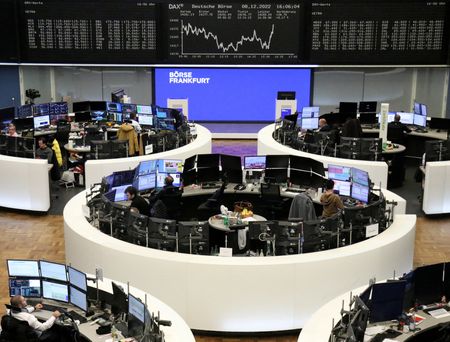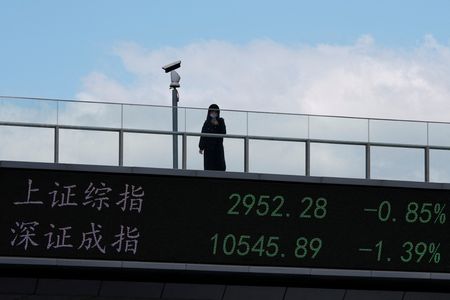By Lawrence Delevingne
(Reuters) -Wall Street stocks gained on Tuesday, while Treasury yields fell and the dollar weakened, as new U.S. government data showed the smallest annual increase in inflation in nearly a year.
The consumer price index increased 0.1% last month after advancing 0.4% in October, the Labor Department said. Economists polled by Reuters had forecast the CPI gaining 0.3%.
The slowdown could give the Federal Reserve cover to start scaling back the size of its interest rate increases on Wednesday.
“This month’s report provides confirmation of October’s step down in inflation pressures and is welcome news for the Fed,” Morgan Stanley strategists wrote in a note on Tuesday morning.
“Tomorrow’s reduction in the pace of tightening to 50 (basis points) was already telegraphed, and with the downtrend in inflation becoming entrenched, the FOMC can set its sights squarely on the labor market.”
Wall Street stocks jumped on the news in morning trading but then pulled back to more modest gains by the afternoon.
The Dow Jones Industrial Average rose about 0.3%, the S&P 500 gained 0.74% and the Nasdaq Composite added 1%. Winners included energy stocks and Moderna Inc, which surged nearly 20% on promising skin cancer vaccine study results.
The pan-European STOXX 600 index rose 1.3% and MSCI’s gauge of stocks across the globe gained about 1%, a pullback from larger gains earlier in the day.
“It was good news on the inflation front, but the equity market is giving back gains as it reflects on, ‘what now?'” Yung-Yu Ma, BMO Wealth Management’s Chief Investment Strategist, said in an email.
“It’s all a balancing act, which we believe points to near-term choppy markets even though the improving inflation backdrop adds a positive bias.”
BOND YIELDS, DOLLAR DIP
U.S. Treasury yields dropped on the November inflation data.
The yield on 10-year Treasury notes was down 9.2 basis points to 3.519%; 30-year yields fell 3.2 basis points to 3.544%, and two-year yields, which typically move in step with interest rate expectations, dropped 16.4 basis points to 4.239%.
The dollar also declined, dropping nearly 1% against a basket of major currencies. It is now down more than 5% over the last three months on investor belief that U.S. inflation has peaked.
The pound gained against the dollar, up about 0.75% to $1.236. Data showed a rise in UK unemployment and an increase in wage growth that will keep Bank of England (BoE) policymakers on edge when they meet this week.
The BoE, Fed and European Central Bank are expected to raise rates by 50 basis points (bps), rather than the 75 bps hikes they delivered earlier in the year.
“If data such as today’s suggest a real trend that the momentum of inflation is lower, we could then see the Fed pause over the next few months at a still restrictive policy-rate, but not one which would put potentially excessive pressure on the economy,” Rick Rieder, BlackRock’s Chief Investment Officer of Global Fixed Income, said in a statement.
Traders are now betting on 25-basis-point increases at each of the Fed’s first two meetings of 2023 and no more, with some chance the last hike could come in May instead of March, bringing the policy rate to between 4.75% and 5%.
COMMODITIES UP
Oil rallied for a second day, having jumped 2.5% on Monday, with U.S. crude up 3.12% to $75.45 per barrel and Brent at $80.68, up 3.45% on the day. The market was buoyed by concern about supply disruptions, including the ongoing shutdown of the Canada-to-U.S. Keystone crude pipeline following a massive leak.
Gold, which is sensitive to shifts in U.S. inflation, also gained, with spot gold up 1.6% to $1,810.26 an ounce and U.S. gold futures up 1.77% to $1,813.90 an ounce.
In cryptocurrencies, bitcoin climbed around 3.4% to $17,750, and crypto-related stocks gained, even as FTX founder Sam Bankman-Fried was arrested and charged by U.S. regulators, and Binance registered $1.9 billion of withdrawals in the past 24 hours.
(Reporting by Lawrence Delevingne in Boston and Amanda Cooper in London; Editing by Grant McCool and Rosalba O’Brien)


